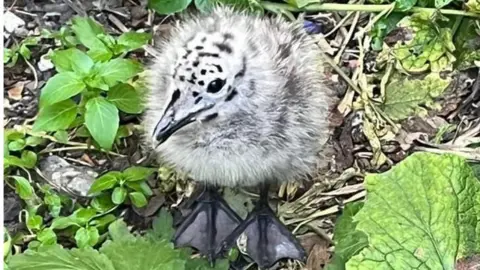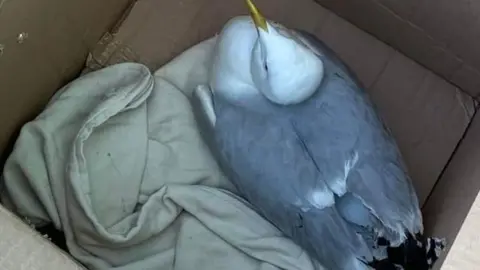Avian Flu: Sussex rescue group overwhelmed by number of casualties
 Justin King
Justin KingA group of wildlife volunteers say they are reaching "breaking point" helping injured birds with avian flu.
The South Coast and Sussex Bird Volunteer Network said it cannot cope after many wildlife centres stopped taking in casualties in the outbreak.
Avian flu has left hundreds of birds dead, dying or orphaned in East and West Sussex, the organisation said.
The UK Health Security Agency said avian flu is "primarily a bird disease" and the public risk is "very low".
The government has issued guidance not to pick up or touch sick wild birds or their carcases.
Justin King, bird volunteer network founder, said the increasing number of casualties was a growing problem.
He said: "We've been rescuing dozens of gulls from Brighton Marina since May. I'm probably putting down about two gulls every day with avian flu. That is heart-breaking."
 Justin King
Justin KingThe organisation is particularly concerned about gulls during their hatching season, which goes on for another month.
Mr King said: "Some of them may not be able to fledge because they have avian flu."
He continued: "Our situation is now totally unmanageable. We are all physically and emotionally exhausted from trying to cope with the sheer volume of rescues."
"What is needed are more fosterers for gulls who are willing to care for a fledgling until August. By that time, they will be strong enough and able to fly."
The organisation has launched a fundraising campaign to help continue its work.
The Department for Environment, Food and Rural Affairs (Defra) said the bird flu outbreak was "devastating for wild bird populations".
It added: "There are limited effective actions that can be taken to protect wild birds, as opposed to captive bird flocks."
"Clear public guidance has been issued not to pick up or touch sick wild birds or their carcases.
"High levels of biosecurity should still be maintained to stop the spread and tackle this worst ever outbreak. This is particularly important if anyone keeps poultry or other captive birds."

Follow BBC South East on Facebook, on Twitter, and on Instagram. Send your story ideas to [email protected].
